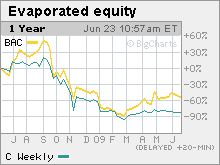Brain drain takes toll at Citi and BofA
Many top traders and bankers have left the financial giants for rivals. The trend may continue as long as Citi and BofA remain under the government's thumb.
 |
| Firms that are not bound by the government restrictions have lured away talent from Citigroup and Bank of America in recent months. |
 |
| Employees of Citi and BofA have seen the value of their restricted stock and options plummet over the past year. |
NEW YORK (CNNMoney.com) -- The so-called brain drain that big banks have worried about ever since the government stepped in to bail out the financial sector appears to be well underway.
And nowhere is that pain being felt more acutely than at Citigroup (C, Fortune 500) and Bank of America (BAC, Fortune 500), the two banks that have received the most aid from the government and are subject to the most onerous restrictions on executive compensation.
Last Friday, Ajay Banga, the CEO of Citigroup's Asia Pacific operations, announced his resignation from the company. Banga, a 13-year firm veteran who quickly rose through the ranks, will take up his new role as chief operating officer at the credit card processor MasterCard (MA, Fortune 500) starting in August.
Banga is perhaps the highest-profile defection from Citi as of late. But several other top bankers, traders and analysts have recently jumped ship for similar jobs at private equity giant Blackstone Group, Germany's Deutsche Bank and the boutique research shop Ladenburg Thalmann.
A day earlier, Bank of America lost one of its top investment bankers and long-time Merrill Lynch veteran William Rifkin to JPMorgan Chase (JPM, Fortune 500), representing the latest high-profile departure from the Charlotte, N.C.-based lender since it completed its purchase of the brokerage giant late last year. Other executives have left for positions at Oppenheimer & Co., Piper Jaffray and British bank Barclays.
Exact figures about the number of departures from Citi and BofA are tough to come by. Calls to both Citigroup and Bank of America requesting comment on the string of recent departures were not immediately returned.
But Citi chairman Dick Parsons conceded at an economic forum last week hosted by CNNMoney.com parent Time Warner that management has had to use terms like "patriotic duty" and the potential of doing "fascinating" work to convince people to work for the embattled firm. (Parsons was formerly the chairman and CEO of Time Warner.)
Parsons' remarks illustrate how difficult it has become for large, troubled financial institutions to attract and retain top employees -- especially those like Citi and BofA which are still part of the Treasury Department's Troubled Asset Relief Program.
"It is normal but it is exacerbated by the fact that those who are stuck in TARP can't compensate their people as well those who aren't," said Anton Schutz, president of Mendon Capital Advisors, a firm that invests in financial stocks.
For months, financial firms have railed against proposed compensation caps, warning it would prompt an exodus of workers at firms that remain under the government's thumb to smaller rivals, foreign banks and the lightly-regulated worlds of private equity and hedge funds.
But now that ten large financial firms, including JPMorgan Chase and Goldman Sachs (GS, Fortune 500), have been permitted to pay back TARP funds, it could become even tougher for Citi and BofA to hold on to top employees.
Last week, the White House proposed to limit bonuses for senior executives and other highly-paid employees at firms that got taxpayer assistance to one third of their total compensation.
And at Citigroup and Bank of America, both of which required "exceptional" government assistance, compensation of the top 100 salaried employees are now set to scrutinized by the newly appointed "pay czar."
Retaining talent, even in boom times, has never been easy for top Wall Street firms. Over the years, would-be 'masters-of-the-universe' types have been quick to jump ship if the pay, opportunities or culture of another firm was attractive enough.
"There is pretty much zero loyalty in this industry" said Peter Cappelli, a professor at the Wharton School at the University of Pennsylvania and director of its Center for Human Resources. "This would be happening whether or not there were TARP."
Still, fears about the heavy hand of government in a bank's day-to-day operations have been tough to shake for many workers.
According to a poll of more than 2,000 finance pros taken earlier this year by the online job site eFinancialCareers.com, just over half of those polled said they were likely to look for work at another financial services firm given the compensation restrictions placed on companies that received aid from the government.
The plunge in bank stock prices also could be giving some Wall Street veterans reason to seek out new jobs.
Many finance pros have watched the value of restricted stock and options whittle away in recent months. John Rogan, a partner and head of the global banking and markets practice at executive search firm Russell Reynolds Associates, said there is a common view that the value of their equity stake may never recover given how far some firms' stocks have fallen.
Shares of Citigroup and Bank of America are worth just a fraction of what they were this fall. And in the case of Citi, many shareholders are bracing for further dilution once the government officially completes the conversion of its preferred shares stake into common stock later this year as part of a broader program to beef up the bank's ailing capital levels.
Sensing that frustration, major European banks such as Deutsche Bank and Barclays (BCS), as well as boutique investment banks like Moelis & Co. and Greenhill and have successfully poached talent from Citi and BofA as well as other big U.S. banks.
But some rivals appear to be particularly targeting Citi and BofA. Five of the last 16 big hires made by Moelis in the past six months, for example, came from either Citigroup or Bank of America.
"The opportunity to move to someplace smaller where you have more control over your own destiny and therefore your own pay is extremely appealing to people these days," said Rogan.
Experts contend, however, that Citi, BofA and other peers that have suffered the loss of top talent, are not standing idly by while bankers and traders leave.
Even before winning their freedom from TARP, many big banks such as Morgan Stanley raised base salaries to try earlier this year to compensate for potential bonus restrictions. The Financial Times reported earlier this month that Citi and Bank of America are following suit with their bankers.
In addition, experts think both lenders may be employing an approach that has become a common practice lately on Wall Street - dangling retention bonuses in front of top performers, or at the very least pledging that a bonus of some sort will be there at year's end now that some businesses, such as bond trading, are booming.
Still, there's also the issue of replacing those who have already left. Of course, Citi and BofA may look within their own ranks to fill the shoes of a top performer like Banga or Rifkin, said Jess Varughese, managing partner at the New York City-based consultancy Milestone, which focuses on the financial services industry.
In most instances, however, the new executives never quite live up to the star power of their predecessors.
"The big name leaves are very, very tough to replace," said Varughese. And that is going to make it even more critical for Citi and BofA to do what they can to hold on to their best and brightest employees. ![]()

